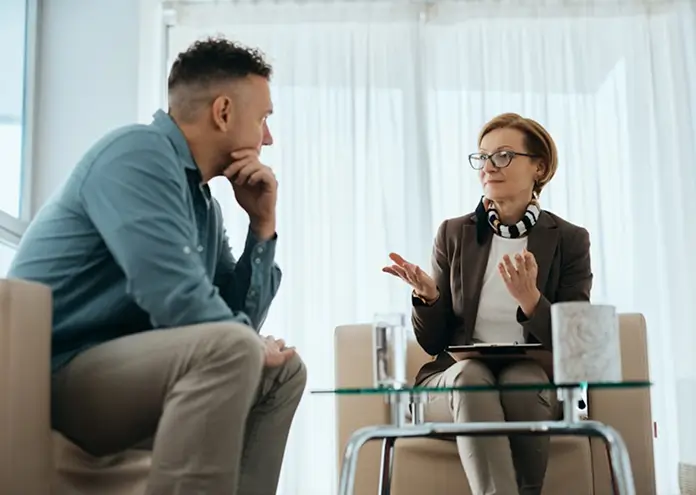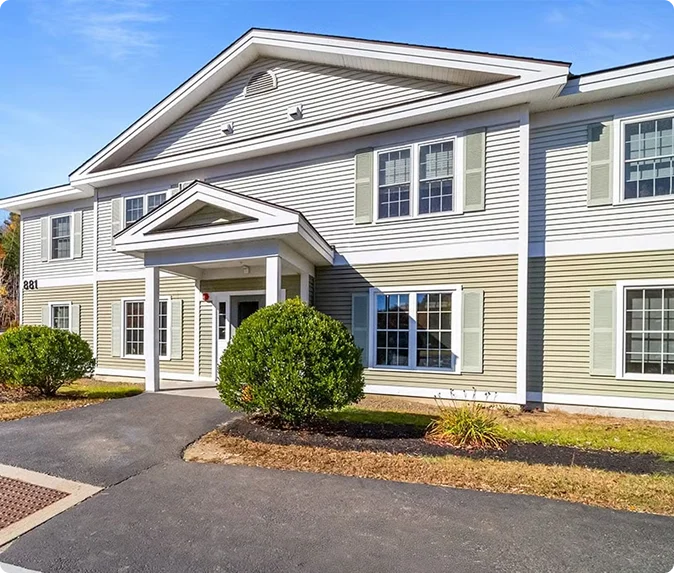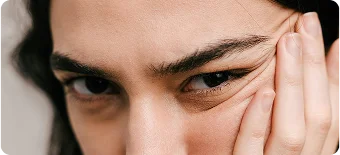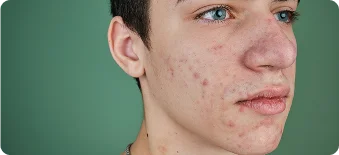Home / Conditions / OCD
Obsessive Compulsive Disorder Treatment in NH
At Live Free Behavioral Health, we help people take back control from OCD. Our inpatient program provides focused care that brings structure, clarity, and relief.


Understanding OCD Disorders
OCD is more than being a perfectionist or having specific habits and preferences. It’s a serious mental health condition that can take over your day. It affects between 1% and 3% of people worldwide, often beginning in childhood or early adulthood (NCBI, 2024).
Obsessive-compulsive disorder is defined by having distressing thoughts (obsessions) and doing repetitive actions (compulsions). These patterns can be disruptive and affect how well you function day-to-day. Many people with OCD also deal with anxiety, depression, or substance use.
What Is Obsessive-Compulsive Disorder?
OCD is a disorder that causes persistent, unwanted thoughts and urges, known as obsessions. To manage the anxiety these thoughts create, someone with OCD might repeat certain behaviors or rituals called compulsions. It’s a pattern that’s often time-consuming and hard to control, even when the person knows they don’t make sense.
OCD and Anxiety: How They're Connected
Obsessive-compulsive disorder isn’t the same as anxiety, but it is part of a group of anxiety-related conditions. Lots of people with OCD also experience generalized anxiety or panic. While anxiety often shows up as worry about life events, OCD adds rituals or repetitive actions that feel necessary to prevent harm or discomfort.

Symptoms and Subtypes of OCD
OCD shows up in different ways. The most common subtypes include:
- Contamination: Frequent handwashing or cleaning to avoid germs
- Symmetry and Order: Needing items to be perfectly arranged or even
- Checking: Repeatedly making sure doors are locked or appliances are off
- Intrusive Thoughts: Disturbing mental pictures or ideas that won’t go away
These behaviors might offer short-term relief, but they keep the anxiety cycle going.
Why Choose Live Free Behavioral Health
Whole-Person Care
We blend evidence-based therapy with movement, mindfulness, and integrative health tools. Our approach provides holistic support.
Personal Treatment Plans
You’re not a number. Your care plan is designed around your strengths, history, and goals, making it completely unique to your needs.
Family Involvement
Families play an important role in recovery. We offer you education, updates, and therapy to strengthen your close relationships.
Life Design Empowerment
We equip you with tools for life after treatment, from daily routines to relapse prevention, so progress continues beyond our walls.
Our Inpatient OCD Treatment Approach
At Live Free, our approach to treatment combines clinical precision with human care. We use proven therapies, compassionate support, and structured daily routines to help you move forward.
Clinical Therapies: CBT, DBT, and ERP
Cognitive-behavioral therapy (CBT): Helps you identify unhelpful thoughts and change the patterns that keep OCD symptoms going.
Dialectical behavior therapy (DBT): Focuses on emotional regulation and building practical coping skills for stress, anxiety, and mood swings.
Exposure and response prevention (ERP): Supports you in facing fears and building confidence without relying on compulsive habits.
Holistic and Experiential OCD Therapies
Yoga and breathwork
Hiking and time in nature
Targeted exercise routines
Life design coaching for structure
This integrative care model helps you reconnect with your body and reclaim your focus.
Family Support and OCD Education From Day One
We welcome families from the start. Our team provides:
Coaching on how to support recovery at home
Family therapy and progress updates
Welcome kits and education tools
OCD Medication Management and Psychiatric Support
Our medical team will monitor all prescriptions and potential side effects. SSRIs (selective serotonin reuptake inhibitors) are the most commonly used medication for OCD. We provide all medication through our program; no outside scripts required.
Our Admission Process
Getting started is easier than you think. We’ve designed our admissions process to be fast, respectful, and stress-free. From your first call, we’re here to support and guide you.
Call or complete our online form
Connect with an admissions coordinator
Complete your private assessment
We determine which level of care suits your needs
We verify insurance and explain the next steps
You receive your admission date and packing info
Our team is available 24/7 to answer questions or talk things through.
Client Testimonials
There’s no better proof than the words of those who’ve already found their way forward.
Thank you to all the staff at live free residential for helping me get to where I am now. I am so appreciative to them helping me jump start my life. They have amazing counselors and staff who helped me with all my aftercare needs. I am so grateful for this program!!!!!!
This place is awesome! The staff is great! They’re caring, compassionate, and empathetic. They treat each resident individually to meet each of their needs. 24 hr nursing staff helps with each residents detox needs. They also help with after care plans and placement back into the community. Peers also are very supportive to eachother, I highly recommend live free recovery to anyone looking for help with addiction.
The facility and staff were extremely helpful and accommodating with my detox. It was a calm environment and the nurses were always available to meet whatever needs I had to help me transition. I would highly recommend coming here if you are looking for help with any addiction.

Who We Treat
Live Free Behavioral Health supports adults who are ready to do the work of healing. We guide each person through the right level of care with safety, dignity, and focus.
Admission Criteria and Clinical Screening
We welcome all mental health inquiries. If someone needs more medical support or is facing serious health challenges, we’ll help guide them to a place that’s better equipped to help right now.
Mild Dual Diagnosis: Anxiety, OCD, and Substance Use
If you have a formally diagnosed mental health condition and are also dealing with substance use, Live Free offers dual diagnosis care. Your primary diagnosis will help determine where best to place you.
Insurances We Accept for OCD Care

What a Typical Day Looks Like
On a typical day, you’ll start with mindfulness and a check-in to ground yourself before diving into therapy. Mornings often focus on skills for managing intrusive thoughts and compulsions, such as CBT or DBT, while afternoons might include creative outlets like art or guided movement. Personal goals are woven in along the way, with time for reflection and peer support to close out the day.

Ready to Reclaim Your Life? Contact Our Specialists
Our compassionate team understands how exhausting it can feel when your brain works differently. Whether you’re calling for yourself or a loved one, we’re here to help. Reach out to us, and we’ll find a treatment plan that suits your circumstances.
Get In Touch
FAQs About OCD and Treatment
What causes OCD?
OCD is linked to a combination of genetics, brain structure, and life experiences. It’s not your fault, and it’s more common than many people realize.
What causes OCD to get worse?
Stress, lack of sleep, substance use, and avoiding treatment can all make OCD symptoms more intense.
How long does inpatient OCD treatment take?
Treatment can last a few weeks to several months. The right length depends on your symptoms, goals, and progress.
Is medication necessary for OCD?
Medication isn’t required for everyone, but it can make therapy more effective. We’ll explore options together.
Do you offer outpatient follow-up care?
Yes. While our OCD program is inpatient, we offer step-down and outpatient options to help you stay on track.
Our Mental Health Resources
Get to know our experienced staff members who bring both clinical expertise and personal insight to the recovery journey.
See published content about our innovative approach to treatment and our impact in New Hampshire communities.
Access helpful tips and expert-backed mental health information. Explore insights into different conditions and advice for ongoing recovery.








